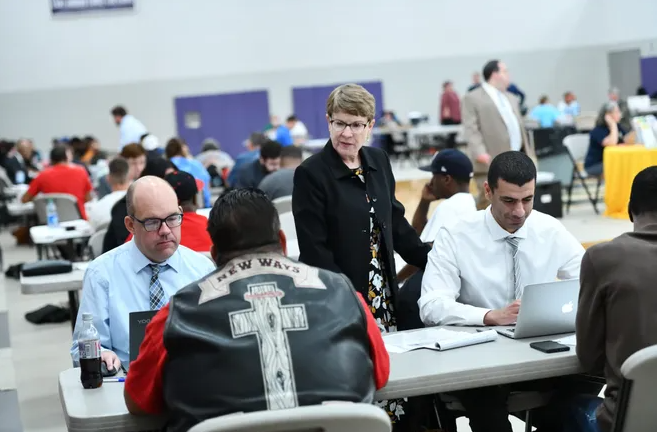
Akron law faculty and students help clients at a reentry outreach clinic.
Reentry Clinic
The University of Akron School of Law’s Reentry Clinic, has been honored as one of the Top 15 Innovative Clinics, and has been recognized by the American Association of Law Schools as an Innovative and Outstanding Program. It provides a premier experience for law students seeking to make a difference in society.
Four Reentry Clinics
1. Certificate of Qualification for Employment (CQE)
The CQE clinic is staffed by volunteer students under the supervision of a clinic faculty member. During CQE clinics, law students meet with clients who have criminal convictions and assist them in applying for a Certificate of Qualification for Employment. In many cases, the law had previously prohibited these ex-offenders from holding certain types of employment or professional licenses. The CQE allows the prospective employer or the licensing authority, in its discretion, to employ or license the ex-offender who holds the Certificate. This program gives our students access to a diverse range of people in the greater Akron community. In doing this, our students help people in a very real way while gaining valuable client experience for the future.
2. Expungement Clinic
The Expungement Clinic is comprised of volunteer law students under the supervision of an attorney. Students working in this clinic gain real world experience by serving low-income Akron residents who seek to have their convictions sealed by the court. As a volunteer in this clinic, you could expect to conduct background searches, develop relationships with clients, and represent the client in the courtroom.
3. Clemency Project
The Clemency Project provides assistance to low-income ex-offenders who seek a pardon for their convictions. Akron Law students in this clinic are trained to handle pardon applications to the Governor. Students continue the client relationship by representing the client at their formal pardon hearing under the supervision of Professor Joann Sahl.
4. Human Trafficking Clinic
The Human Trafficking Clinic assists victims of human trafficking to expunge (destroy) their criminal records. Typically, victims of human trafficking are likely to have convictions for solicitation or prostitution, which were forced upon them by the traffickers. As a part of this clinic, our students conduct investigations and screen for potential clients. Our students then follow up with clients and conduct investigations. Like Akron Law’s other clinics, the Human Trafficking Clinic offers students real-life practice and a new life to those in need.
 Click here to listen to Akron Mirror Podcast on Spotify. Joann Sahl and Russ Nichols from the University of Akron School of Law’s Reentry Clinic join librarians Ris and Keith to discuss what legal options are available for those who are justice involved to seal or expunge their records. Akron Mirror is a podcast of the Akron-Summit County Public Library.
Click here to listen to Akron Mirror Podcast on Spotify. Joann Sahl and Russ Nichols from the University of Akron School of Law’s Reentry Clinic join librarians Ris and Keith to discuss what legal options are available for those who are justice involved to seal or expunge their records. Akron Mirror is a podcast of the Akron-Summit County Public Library.
In the news
Ohio Governor’s Expedited Pardon Project celebrates 100th pardon. (12/20/2023)
Volunteer Reentry Outreach Clinic (05/21/2023)
